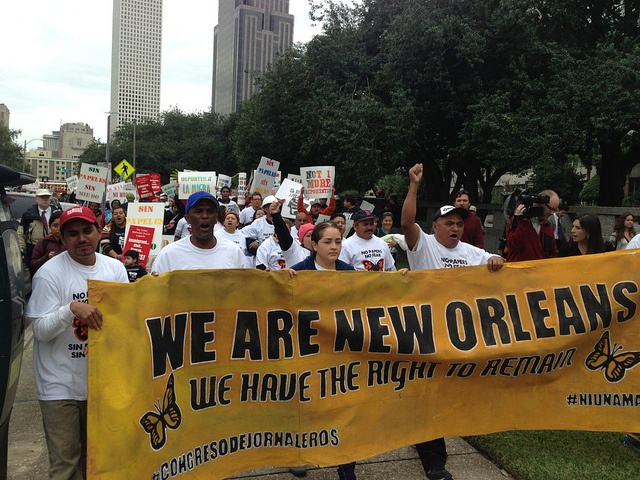New Orleans' new civil rights leaders

By Bill Quigley
Like many cities in the South, New Orleans has a proud history of civil rights leadership -- along with an equally grim history of civil rights violations. That history is repeating itself today. The African American community is again facing economic injustice and abuse from law enforcement. But, this time, the immigrant workers who rebuilt New Orleans after Hurricane Katrina are also the targets of brutal civil rights violations. And those same workers are showing extraordinary bravery in fighting to end them.
In November 2013, I was proud to stand alongside immigrant workers and community leaders engaging in peaceful civil disobedience in New Orleans to expose a brutal program of stop and frisk racial profiling-based immigration raids called CARI (Criminal Alien Removal Initiative), which targets Latinos.
Squads from Immigrations and Customs Enforcement (ICE), together with local police, have been conducting race-based immigration raids anywhere Latinos gather: stores, apartment buildings, churches, laundromats. The raids have led to constant terror for the immigrant workers and families who rebuilt the city we live in and love.
The blatantly unconstitutional nature of the raids led to a Congressional inquiry and front-page coverage in the New York Times. Yet ICE continues to rely on them to meet its massive deportation quotas.
This week I visited a worker named Yestel Velazquez, who is in the South Louisiana Correctional Center awaiting deportation after a recent CARI raid. Yestel was going about his daily life, getting his car repaired at a Latino auto shop in a heavily Latino suburb of New Orleans, when ICE and local police surrounded the shop and grabbed every Latino in sight.
After their arrests, Yestel and a fellow worker named Wilmer Irias-Palma filed civil rights complaints against ICE about the raid. While in detention last week, Yestel and Wilmer participated in a public briefing with D.C. civil rights leaders by phone. ICE immediately retaliated by fast-tracking Yestel and Wilmer for deportation, racing to hide the evidence of its own civil rights abuses by shipping the complainants out of the country. Wilmer was deported on Friday, and Yestel has been told he is to be deported this Friday.
This is the shape of New Orleans' new civil rights crisis. It's one that faces millions of immigrant workers around the United States. People with families and deep roots in our communities live in constant fear of unconstitutional, race-based, stop-and-frisk style raids. And when they speak up about the abuse, they face retaliation by the same rogue immigration agency that puts deportation quotas above all else, including basic constitutional protections. ICE can commit civil rights abuse with impunity, because when whistleblowers like Yestel and Wilmer are brave enough to speak up, ICE simply deports the evidence.
All this is taking place while the United States is under review this week by the U.N. Committee on the Elimination of Racial Discrimination (CERD) for human and civil rights violations. The failure of the Obama administration to protect the rights of immigrant workers is one of the many ways the U.S. is falling behind on its obligations to CERD -- and to its own basic principles.
When I met with Yestel this week, he said: "They are punishing me because I spoke the truth, but I get my strength from my love for my kids and my family. ICE must stop racially profiling Latinos and targeting honest people who are trying to make a living. And Obama must face this civil rights crisis head on."
I couldn't agree more. Yestel and immigrant civil rights leaders like him deserve freedom, not deportation. ICE's race-based community immigration raids need to stop. And as President Obama prepares to take executive action on immigration, the stories of Yestel and Wilmer should demonstrate that what is at stake is a matter of civil rights. The immigrant workers and families who helped rebuild New Orleans show their bravery every day. The President needs to do the same by taking bold action to protect the immigrant civil rights leaders who are fighting for what we all hold dear.
(Bill Quigley is a human rights lawyer and law professor at Loyola University New Orleans. He can be reached at quigley77@gmail.com.)
